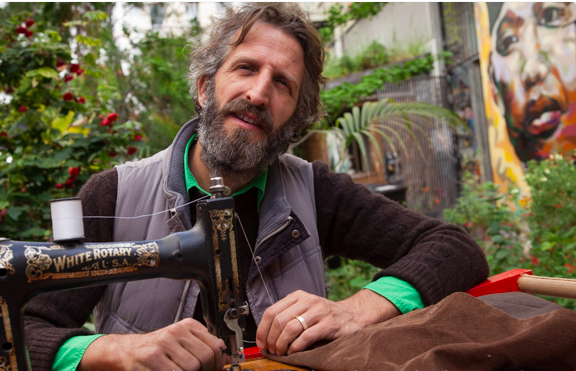Michael Swaine has had a singular goal since starting the Free-Mending Library in San Francisco: to mend both literally and figuratively.
Swaine, an inventor, innovator and a member of the Future Farmers art collective, held a lecture at the Chazen Museum of Art where he talked about this project and more, just one week after his fellow Future Farmers collaborator Amy Franceschini did.
The Free-Mending Library is a simple, yet important project in which Swaine has been visiting The Tenderloin, an extremely diverse, but low-income neighborhood in San Francisco.
With just a simple cart, treadle sewing machine and umbrella for shade, Swaine offers free sewing and mending services on the 15th of every month. According to Swaine, having a sewing machine on the sidewalk, as opposed to inside of a house or studio, “creates a rift in reality” that begs interest.
While tourists are often advised to avoid Tenderloin’s neighborhoods in San Francisco, Swaine believes “it’s the most vibrant part of the city.” And he should know considering he mends, tears and talks with his regular patrons and new faces alike until the sun goes down.
In naming this project, Swaine wished to invoke the welcoming image of community, much like a public library. He urges anyone and everyone to borrow thread, buttons and other supplies, to use his services and to receive sewing lessons.
Despite Swaine’s artistic background, he dislikes framing the project as just an art project, because to him it is much more than that.
“I frame it with the function … this is a mending library,” Swaine said.
His other projects too often involve functional, environmental or educational purposes and have a large group or community aspect. Swaine said he turns to large scale or political issues, such as atomic bombs, for artistic inspiration and ideas.
Such an example is the “Pedestrian Press,” a project Swaine collaborated on with Future Farmers. It was a politically-oriented project where people wear shoes with different letter stamps on their soles, and through cooperation and teamwork the group created a human-powered printing press. In order to project a message about waste, the ink used for the print was from soot off the street.
From this lecture, it was clear Swaine has been able to accomplish something great in channelling his lifelong interests in both craftsmanship and activism through both his personal and collaborative efforts.


